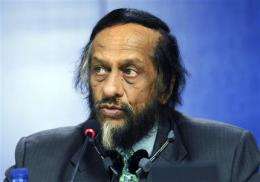United Nations to probe climate e-mail leak

(AP) -- The United Nations will conduct its own investigation into e-mails leaked from a leading British climate science center in addition to the probe by the University of East Anglia, a senior U.N. climate official said Friday.
E-mails stolen from the climate unit at the University of East Anglia appeared to show some of world's leading scientists discussing ways to shield data from public scrutiny and suppress others' work. Those who deny the influence of man-made climate change have seized on the correspondence to argue that scientists have been conspiring to hide evidence about global warming.
In an interview with BBC radio, the chairman of the Intergovernmental Panel on Climate Change, Rajendra Pachauri, said the issue raised by the e-mails was serious and said "we will look into it in detail,"
"We will certainly go into the whole lot and then we will take a position on it," he said. "We certainly don't want to brush anything under the carpet."
The University of East Anglia has defended the integrity of the science published by the climate unit and its researchers, but on Thursday said it would investigate whether some of the data had been fudged. Phil Jones, the director of the unit, stepped down earlier in the week pending the result of the investigation.
East Anglia said its review will examine the e-mails and other information "to determine whether there is any evidence of the manipulation or suppression of data which is at odds with acceptable scientific practice."
The theft of the e-mails and their publication online - only weeks before the U.N. summit on global warming - has been politically explosive, even if researchers say their content has no bearing on the principles of climate change itself.
Britain's Ed Miliband, the climate change secretary, acknowledged the revelations may have an impact on the Copenhagen talks on a new global emissions reduction pact, but dismissed as "flat Earth-ers" critics who claim the e-mails are proof the case for man-made climate change is exaggerated.
"We need maximum transparency including about all the data but it's also very, very important to say one chain of e-mails, potentially misrepresented, does not undo the global science," Miliband said Friday. "I think we want to send a very clear message to people about that."
"There will be people that want to use this to try and undermine the science and we're not going to let them," he said.
Republicans in the U.S. House of Representatives have grilled government scientists on the leaked e-mails in a hearing Wednesday in Washington, but the scientists countered that the e-mails don't change the fact that the Earth is warming.
"The e-mails do nothing to undermine the very strong scientific consensus ... that tells us the Earth is warming, that warming is largely a result of human activity," said Jane Lubchenco, head of the National Oceanic and Atmospheric Administration.
She said the e-mails don't address data from her agency or the U.S. space agency NASA, which both keep independent climate records that show dramatic global warming.
©2009 The Associated Press. All rights reserved. This material may not be published, broadcast, rewritten or redistributed.
















